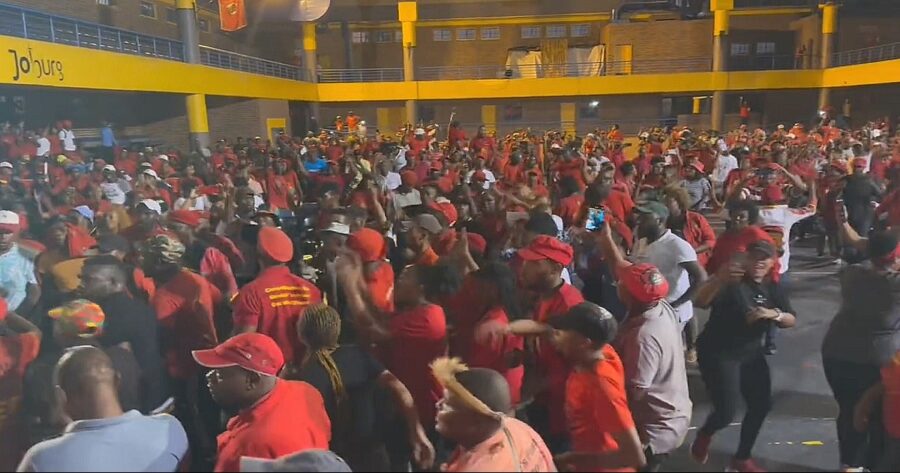On Monday, at the stroke of midnight, South Africa witnessed a national shutdown organized by the Economic Freedom Fighters (EFF) leader, Julius Malema. The shutdown aimed to protest against the government’s policies that, according to Malema, have led to the worsening economic situation in the country.
Julius Malema has been a vocal critic of the ruling African National Congress (ANC) party, which has been in power since the end of apartheid in 1994. He has accused the ANC of corruption, mismanagement, and failure to address the country’s pressing issues. Malema has argued that the ANC has become a party that is no longer committed to the principles of the liberation struggle and has instead become a party of elites that is out of touch with the people.
Malema’s call for a national shutdown was aimed at protesting against the government’s policies, which he claimed were responsible for the worsening economic situation in the country. Malema has argued that the government has failed to create jobs, reduce poverty, and address inequality. He has accused the government of being corrupt and serving the interests of a few rather than the majority of the population.
South Africa has also been facing rolling blackouts, also known as load shedding, for several years. Load shedding occurs when the national power utility, Eskom, cuts power to certain areas to balance supply and demand. The rolling blackouts have significantly impacted the economy, causing business disruptions, productivity, and job losses.
Malema has argued that the rolling blackouts are a result of the government’s failure to invest in the country’s energy infrastructure. He has accused the government of mismanaging Eskom and failing to address the root causes of the power crisis. Malema and many economic experts have also criticized the government’s decision to invest in nuclear energy, which they argues is too expensive and not a sustainable solution at an estimated $50 – $70 Billion USD.
Malema’s call for a national shutdown was partly a response to the rolling blackouts. He argued that the shutdown would be an opportunity for people to protest against the government’s mismanagement of the power crisis and demand that the government take action to address the situation.
According to the government’s National Development Plan (NDP), the hope is to have 90% of South Africa’s population powered by Nuclear energy by 2050. Currently, the country’s twin-unit Koeberg nuclear power plant contributes to 5% of the country’s population. And roughly 79% percent is still reliant on coal-powered plants and 12% electric.
The South African government responded to Malema’s call for a national shutdown by warning that any violent protests would be met with force. “South Africa is governed by the rule of law. We are a constitutional democracy. Disorder and anarchy will not be allowed in South Africa.” Tweeted the South African President, Cyril Ramaphosa
The government deployed police and military personnel to key areas, including major cities, to maintain law and order. The government also warned that any attempts to disrupt essential services, such as hospitals and public transportation, would be met with swift action.
Despite the government’s warning, tens of thousands of protestors lined the streets of South Africa on Monday, many peacefully protesting against the government’s policies. However, videos surfaced of law enforcement officers beating citizens, leading to international condemnation of the government’s handling of the protests.
In a post on his EFF’s Twitter feed, they accused President Ramaphosa of failing to address the country’s social and economic issues, leading to increased unemployment and poverty. The statement argued that since Ramaphosa took office, the number of unemployed people had increased from 8.2 million to more than 11 million. The EFF called for Ramaphosa’s resignation, arguing that he was not fit to lead the country.
The call for the National Shutdown still very much has the lingering stench of apartheid. Although the practice of segregation was abolished on June 17, 1991, after over a half-century of black oppression and colonialism, it can not be dismissed.
The country still suffers from deep-seated inequality and segregation. In some cities, a street can separate rich white housing developments from poor, densely populated black housing communities.
While there have been a few black presidents in South Africa since the end of apartheid, the legacy of the system is still present. It continues to affect the country’s economy and society. The EFF has been one of the loudest voices in calling for radical change in South Africa, arguing that the country needs to break away from the economic policies of the past and focus on creating a more equitable society.
It is the responsibility of every government and political party’s responsibility to act in its people’s best interest and work towards improving their quality of life. The recent national shutdown in South Africa highlights the importance of addressing issues such as unemployment and inequality, which can lead to protests and social unrest. While protests are a valid form of expression, violence should never be condoned. It is essential for governments to listen to the grievances of their citizens and work towards finding solutions to the challenges they face while also upholding the rule of law and maintaining peace. Only then can societies thrive and achieve true progress.









